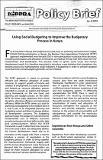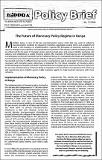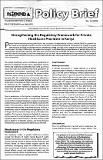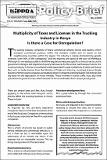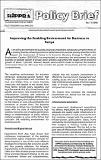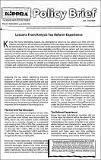Search
Now showing items 1-10 of 14
Policy Brief No. 09 of 2006 on Using Social Budgeting to Improve the Budgetary Process in Kenya
(The Kenya Institute for Public Policy Research and Analysis, 2006)
For a long time in Kenya, the budget has focused more on achieving macroeconomic targets .
Despite being participatory in design, the Medium Term Expenditure Framework (MTEF)
approach implemented since the year 2000 is ...
Policy Brief No. 17 of 2006 on the Future of Monetary Policy Regime in Kenya
(The Kenya Institute for Public Policy Research and Analysis, 2006)
Monetary policy is one of the key macroeconomic policy tools that are used to influence
macroeconomic variables by regulating monetary aggregates and/or terms and availability of
credit in the economy. Its implementation ...
Policy Brief No. 16 of 2006 on Strengthening the Regulatory Framework for Private Healthcare Providers in Kenya
(The Kenya Institute for Public Policy Research and Analysis, 2006)
Private healthcare provision has grown from a few providers at independence to about 2,640 by 2004.This growth can
be traced in two periods. The first was the 1970s when the government allowed civil servants to engage in ...
Policy Brief No. 05 of 2006 on Multiplicity of Taxes and Licenses in the Trucking Industry in Kenya. Is there a Case for Deregulation?
(The Kenya Institute for Public Policy Research and Analysis, 2006)
The trucking industry comprises of heavy commercial vehicles (lorries and trailers), which
transport commercial products within the domestic market and on transit to the
neighbouring countries within the region. The ...
Policy Brief No. 11 of 2006 on Improving the Enabling Environment for Business in Kenya
(The Kenya Institute for Public Policy Research and Analysis, 2006)
An enabling environment for business improves investment climate and competitiveness of
a country, thereby enhancing economic performance for eventual poverty reduction. In this
regard, the Government of Kenya in its ...
Policy Brief No. 10 of 2006 on Lessons From Kenya's Tax Reform Experience
(The Kenya Institute for Public Policy Research and Analysis, 2006)
Kenya, like many developing nations, has attempted to reform its tax system over time, with the
impetus coming from the increasing complexity of the tax codes, narrow tax base and concerns with
fair distribution of tax ...
Discussion Paper No. 55 of 2006 on Financing of Secondary Education in Kenya: Costs and Options
(The Kenya Institute for Public Policy Research and Analysis, 2006)
This study examines the financing of secondary education in Kenya and explores possible financing options for the next ten years. This study uses data from various sources, including education trend statistics, the 2003 ...
Discussion Paper No. 57 of 2006 on Mainstreaming Social Budgeting into the Budgetary Process in Kenya
(The Kenya Institute for Public Policy Research and Analysis, 2006)
This study analyses the current MTEF budgetary process in Kenya with the
aim of examining the extent to which it addresses the concerns of the social
sector. It reveals that the MTEF budget process is not efficient in ...
Discussion Paper No.63 of 2006 on Determinants and Strategies for Expanding Access to Secondary Education in Kenya
(The Kenya Institute for Public Policy Research and Analysis, 2006)
This study analyses the status, determinants and strategies for expanding access to secondary education in Kenya. A logit model is used to analyse the factors influencing access to secondary education schooling in Kenya. ...
Discussion Paper No. 62 of 2006 on Public Sector Procurement in Kenya: The Need for a Coherent Policy Framework
(The Kenya Institute for Public Policy Research and Analysis, 2006)
Persistent controversies in Kenya's public procurement and the resultant
negative impacts on efficient public service delivery can be explained, in
part, by weak enforcement of the existing legislation. A coherent
public ...

